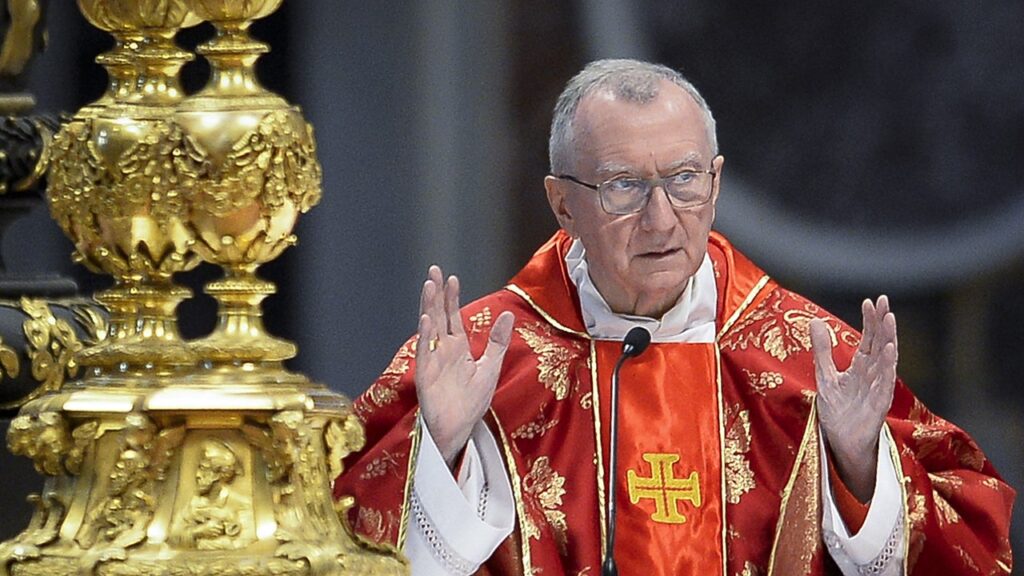In a significant declaration, the Vatican’s top diplomat condemned the violent actions stemming from both Hamas and Israel amidst the ongoing conflict. Cardinal Pietro Parolin criticized the “inhuman” attacks executed by Hamas on October 7, which resulted in substantial loss of life, while simultaneously decried Israel’s military actions in Gaza that have led to widespread devastation. Under the leadership of the new Pope Leo XIV, the Vatican’s stance has shifted towards a firmer call for accountability and adherence to humanitarian principles. This condemnation has sparked discussions about the broader implications for international diplomacy and humanitarian law.
| Article Subheadings |
|---|
| 1) Vatican’s Harsh Criticism of Hamas |
| 2) Condemnation of Israel’s Military Actions |
| 3) The Role of International Community |
| 4) Call for Humanitarian Law Compliance |
| 5) The Vatican’s Evolution in Diplomacy |
Vatican’s Harsh Criticism of Hamas
Cardinal Pietro Parolin, the Secretary of State for the Vatican and an advisor to Pope Leo XIV, issued a strong rebuke against Hamas regarding the October 7 attacks. This militant group launched a surprise offensive that claimed approximately 1,200 lives and saw hundreds of citizens taken hostage. Parolin described these actions as “inhuman and indefensible,” marking a firm stance by the Vatican against violence targeting civilians. His remarks not only highlight the tragedy inflicted by the surprise assault but also signify the Vatican’s ongoing commitment to human dignity, even amidst polarized views.
Condemnation of Israel’s Military Actions
In addition to condemning the attacks by Hamas, Parolin took aim at Israel’s retaliatory measures, which he described as extending far beyond proportionality. The Cardinal noted that the military strategy employed by Israel has reduced vast neighborhoods in Gaza to ruins, exacerbating the plight of an already oppressed population. He articulated that legitimate self-defense must adhere to the principle of proportionality, emphasizing that the scale of Israeli military action against a largely defenseless population raises pressing ethical concerns. Reports from Hamas-run health authorities indicate that the conflict has resulted in over 67,000 fatalities, predominantly among civilians, raising alarms about humanitarian implications.
The Role of International Community
Parolin articulated deep concern over the apparent lack of action from the international community in addressing the suffering in Gaza. He asserted that global powers have shown paralysis, and those capable of influencing the situation have fallen short of taking meaningful steps to halt what he termed an “ongoing massacre.” The repercussions of inaction could ripple through diplomatic relations and prolong the humanitarian crisis, as civilians bear the brunt of conflict fueled by geopolitical tensions. He urged nations and organizations engaged in dialogue to proactively seek resolutions that prioritize humanitarian safety over political leverage.
Call for Humanitarian Law Compliance
In reiterating calls for respect towards humanitarian law, Parolin invoked Pope Leo XIV’s statements concerning the necessity to protect civilians and to adhere to prohibitions against collective punishment and indiscriminate use of force. He emphasized the paramount importance of humanitarian principles in times of conflict, urging that all parties involved must prioritize civilian safety and welfare above tactical gains. He cited the plight of families residing in war-torn regions of Gaza, whose lives have been irrevocably altered by the violence prevailing around them. The call for compliance with these laws addresses not only moral obligations but also the legal frameworks established to safeguard human rights.
The Vatican’s Evolution in Diplomacy
The statements from Cardinal Parolin reflect a notable shift in the Vatican’s diplomatic approach under Pope Leo XIV’s leadership, who succeeded Pope Francis in May 2025. The Vatican is adopting a more assertive posture regarding international conflicts, as evidenced in its unambiguous condemnation of both sides in the Israel-Palestine conflict. Parolin’s rebukes demonstrate the Church’s commitment to balance and fairness, situating empathy for all civilian lives amid tumult. However, this shift could also attract scrutiny regarding the Vatican’s historical positions and partnerships, leading to further discussions on the effectiveness of religious institutions in mediating modern geopolitical issues.
| No. | Key Points |
|---|---|
| 1 | Cardinal Pietro Parolin condemned Hamas for the October 7 attacks on Israel. |
| 2 | Israel’s military actions in Gaza have drawn sharp criticism from the Vatican for exceeding proportionality. |
| 3 | Parolin called out the international community for inaction in the ongoing Gaza conflict. |
| 4 | The Vatican stresses adherence to humanitarian laws protecting civilians in conflict zones. |
| 5 | Under Pope Leo XIV, the Vatican’s diplomatic stance is evolving, becoming more assertive in international affairs. |
Summary
Cardinal Parolin’s remarks signify an important moment for the Vatican in how it engages with contemporary global conflicts. By openly condemning violence from both sides, the Vatican seeks to advocate for human dignity, peace, and adherence to international norms. The increasing call for accountability from the international community could also pave the way for constructive dialogue aimed at fostering peace in regions plagued by war. As the Vatican steps into a more pronounced role in diplomatic conversations, the implications for peace-building efforts in the Israel-Palestine conflict could be profound.
Frequently Asked Questions
Question: What actions did Hamas take on October 7?
Hamas launched a surprise attack on Israel, which resulted in the deaths of approximately 1,200 individuals and multiple hostage situations.
Question: What has the Vatican’s stance been on Israel’s military actions in Gaza?
The Vatican, through Cardinal Parolin, condemned Israel’s military actions, labeling them as disproportionate and contributing to widespread civilian harm.
Question: Why is the international community being criticized for its inaction?
Cardinal Parolin criticized the international community for failing to effectively intervene and halt the violence in Gaza, which he termed an “ongoing massacre,” highlighting a need for accountability and action.
